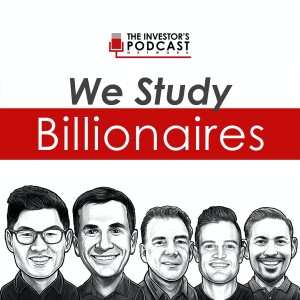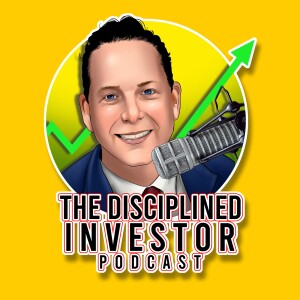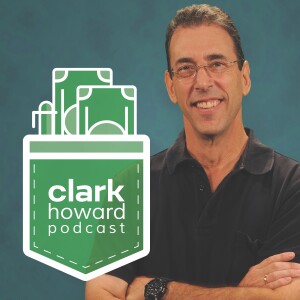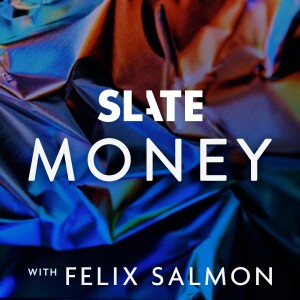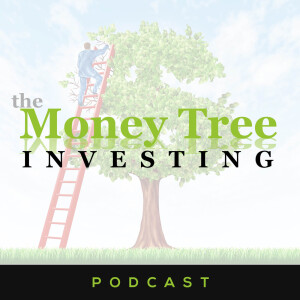

Money Tree Investing
https://moneytreeinvesting.libsyn.com/rssEpisode List

Should You Be Buying This Precious Metal This Christmas?
Should you be buying this precious metal this Christmas? Find out what it is today as we reflect on how instant gratification, social media, and shifting consumer behavior mirror broader economic changes. We also talk practical year-end investing discipline, including portfolio "hygiene," investor psychology alignment, rule-based decision making, and tax-loss harvesting strategies. We explore assesing holdings as if investing fresh today, managing oversized winners and stagnant losers, watching natural market turning points around year-end, while also exploring inflation trends, shrinkflation, housing affordability, and generational cost pressures. We also urge listeners to use the final weeks of the year to review risks, taxes, family financial clarity, and opportunities ahead. Thoughtful preparation, not momentum or emotion, drives long-term investment success. We discuss... The importance of year-end portfolio assessment, emphasizing reviewing holdings as if investing fresh today to determine alignment with investor psychology. Manage oversized winners, stagnant losers, and follow disciplined, rule-based investment practices rather than ego-driven decisions. Tax-loss harvesting is a key strategy, including the special advantage that crypto is treated as property and not subject to the 30-day wash-sale rule. Monitoring natural market turning points, particularly around year-end, to identify potential buying opportunities in beaten-down assets. Gold's leadership in the rally, silver's sharp recent gains, and the implications of JP Morgan shifting from short to long silver positions. Basel III banking regulations and the possibility of global banks increasing gold holdings if U.S. deficits rise above projected thresholds. Strategies for buying gold and silver, emphasizing buying for weight to minimize premiums and potentially profiting from historical spreads in coin pricing. Have caution with rare coin premiums, only experienced investors should consider numismatic factors, otherwise stick to weight-based purchases. Inflation indicators, using Campbell's Soup can pricing as a proxy for quality-adjusted inflation over decades. Shrinkflation and the rising cost of essentials for younger generations, noting housing, insurance, and other expenses have outpaced wages. Recent trends in housing, including declining new home prices but smaller home sizes, illustrating hidden inflation and cost pressures. Today's Panelists: Kirk Chisholm | Innovative Wealth Douglas Heagren | Mergent College Advisors Follow on Facebook: https://www.facebook.com/moneytreepodcast Follow LinkedIn: https://www.linkedin.com/showcase/money-tree-investing-podcast Follow on Twitter/X: https://x.com/MTIPodcast For more information, visit the show notes at https://moneytreepodcast.com/buying-this-precious-metal-this-christmas-775

Why Stocks and Gold Are Soaring in a World Full of Risk with George Economou
Economist George Economou joins us today to share why stocks and gold are soaring in the modern global market. He talks about his global outlook on markets amid rising economic and geopolitical uncertainty, AI-driven growth narratives, stock buybacks, and deep investor anxiety fueled by a multipolar world. We also chat on trade tensions, and escalating conflicts across the globe. He explained how falling interest rates continue to prop up U.S. and European stocks despite stretched valuations, why gold is surging as central banks and investors hedge geopolitical risk, and why tariffs are unlikely to succeed economically over the long run. We discuss... George Economou outlined his background as a Greece-based macroeconomist, financial consultant, academic, and economics educator. Rising tariffs, shifting trade policies, and the growing independence of BRICS nations are major sources of macro instability. Europe is particularly vulnerable, with echoes of pre-2008 risks despite strong headline equity performance. U.S. equity markets are being driven by AI-led profit growth, excess liquidity, and falling interest rates rather than pure fundamentals. European equity strength is largely attributed to corporate stock buybacks rather than underlying economic health. Falling interest rates globally were highlighted as a key driver pushing investors away from bonds and into equities. Gold prices were said to be surging due to geopolitical uncertainty and aggressive central bank accumulation, especially by BRICS nations. Geopolitical risks involving Russia–Ukraine, the Middle East, and China–Taiwan are central drivers of market anxiety. Tariffs are a political tool aimed at reshoring U.S. production, but one that economic theory suggests will be inefficient long term. AI investment is comparable to early smartphone adoption, requiring heavy upfront spending before productivity gains become visible. CEOs' frustration with AI returns is linked to poor implementation rather than a lack of long-term potential. Extremely high global equity valuations are attributed to investors avoiding bonds and real estate due to unattractive risk-reward dynamics. Sustained market valuations is questioned, with the warning that expensive assets eventually decline when buyers step away. Today's Panelists: Kirk Chisholm | Innovative Wealth Barbara Friedberg | Barbara Friedberg Personal Finance Diana Perkins | Trading With Diana Follow on Facebook: https://www.facebook.com/moneytreepodcast Follow LinkedIn: https://www.linkedin.com/showcase/money-tree-investing-podcast Follow on Twitter/X: https://x.com/MTIPodcast For more information, visit the show notes at https://moneytreepodcast.com/stocks-and-gold-are-soaring-george-economou-774

The Federal Reserved Tipped It's Hand For a Bull Market In…
The Federal Reserve tipped it's hand for a bull market. Today we discuss the details. We talk economic divergence, as decades of debt-fueled growth and asset inflation have benefited boomers and asset owners while leaving younger generations locked out of housing and upward mobility, creating frustration and political volatility. The U.S. economy is fundamentally leveraged by pulling future earnings forward and this could be an eventual but unpredictable global financial reset. We also talk the near-term debt panic but don't get nervous as deficits are the true risk. We also talk practical investing takeaways around market cycles, sentiment, tax-loss selling, Santa Claus rally dynamics, and the importance of patience, diversification, and avoiding extreme, fear-driven decisions. We discuss... We highlight generational economic disparities, noting younger people struggle with housing affordability and wealth accumulation compared to boomers. Economic frustration among younger generations is linked to the appeal of populist political figures who speak to lived experiences. The U.S. economy is heavily leveraged, with future earnings being pulled forward to maintain growth and consumption. We warn of a potential global financial reset, while emphasizing that timing and specifics are uncertain. Central banks' accumulation of gold is a signal of perceived systemic risk and preparation for a global reset. Debt itself can be manageable, but the ongoing growth of deficits is the real problem. Concerns about foreign countries dumping U.S. bonds were dismissed as largely impractical due to mutual economic harm. Market reactions to Fed rate cuts are analyzed, showing how assets like stocks, silver, the dollar, and Treasury yields respond differently. It's important to analyze market cycles and sentiment, rather than relying on GDP or simplistic economic indicators. Tax-loss selling and end-of-year market dynamics are discussed as opportunities to buy undervalued assets with lower downside risk. The Santa Claus rally and January market patterns are historically strong indicators for short-term gains. Focus on sectors or assets that were beaten down, watch early January flows, and avoid extreme, fear-driven moves. Today's Panelists: Kirk Chisholm | Innovative Wealth Douglas Heagren | Mergent College Advisors Follow on Facebook: https://www.facebook.com/moneytreepodcast Follow LinkedIn: https://www.linkedin.com/showcase/money-tree-investing-podcast Follow on Twitter/X: https://x.com/MTIPodcast For more information, visit the show notes at https://moneytreepodcast.com/the-federal-reserved-tipped-its-hand-773

Reinventing Taxes to Make Them Work for You with John Thompson
John Thompson is here today to talk about how the future is reinventing taxes. He discusses his diverse career path from technology and programming into finance, tax services, and nonprofit work, highlighting his long-term involvement with the Financial Health Network and their efforts to improve consumer financial health. He explains how H&R Block has evolved from serving primarily low- and middle-income clients to addressing more complex financial needs, and how automation and technology are changing tax preparation and accounting. Thompson emphasizes the importance of personal finance fundamentals, daily cash-flow systems, and awareness in managing income, debt, and budgeting amid rising costs and structural challenges like housing and healthcare. We discuss... John Thompson shares his career journey from technology and programming into finance, tax services, and nonprofit work. He highlights his 25-year relationship with the Financial Health Network and their mission to improve consumer financial health. John explains how research on bridging taxes and banking for underbanked populations inspired practical programs at H&R Block. He describes the evolution of H&R Block from serving primarily low- and middle-income clients to addressing more complex financial needs. Automation and technology in tax preparation are allowing professionals to focus on higher-value advisory services rather than data entry. Thompson emphasizes the importance of daily personal finance systems to manage cash flow, spending, saving, and debt. Challenges like inflation, housing affordability, student loans, and healthcare costs create structural barriers to financial health. Thompson discusses how banks and financial institutions are experimenting with different models to serve both underbanked and community-focused customers. He points out that for many simple tax filers, future trends may simplify filing to automated or postcard-level processes. Thompson stresses the importance of taking timely financial actions at key moments, like tax season, raises, or job changes. He highlights upcoming policy and product changes, such as the retirement savings match in 2027–2028 and child savings accounts starting in 2025. Thompson underscores that financial resilience requires both structural solutions and disciplined personal money management. Today's Panelists: Kirk Chisholm | Innovative Wealth Barbara Friedberg | Barbara Friedberg Personal Finance Follow on Facebook: https://www.facebook.com/moneytreepodcast Follow LinkedIn: https://www.linkedin.com/showcase/money-tree-investing-podcast Follow on Twitter/X: https://x.com/MTIPodcast For more information, visit the show notes at https://moneytreepodcast.com/reinventing-taxes-john-thompson-772

This December Secret Could Be Your Best Trade of the Year
This could be your best trade of the year! Join us as we share December secrets for your portfolio. We also talk about the shifting narratives around climate change, deregulation, and rising energy demand driven by AI. We also explore expectations for low energy prices through the election cycle, concerns about an AI-driven bubble, the continued K-shaped economy, and tactical investing insights such as exploiting year-end tax-loss selling, watching beaten-down sectors, monitoring insider buying, and recognizing mutual-fund distribution dips. We discuss... Political climate influences environmental narratives, pointing out that media references to "climate crisis" suddenly dropped as energy demand pressures changed. The explosion of AI data centers has quietly forced policymakers to pivot from anti-energy rhetoric to encouraging more electricity production and deregulation. How AI companies are now some of the largest new consumers of electricity, making cheap, abundant power a strategic priority for the tech sector. Energy prices are being politically managed to stay low into the midterm elections to keep inflation optics favorable. While AI valuations are stretched, there's unlikely to be an immediate bubble burst because capital flows and earnings momentum remain supportive. How end-of-year tax-loss harvesting creates forced selling in beaten-down stocks, temporarily pushing prices below fair value. Mutual funds selling to raise cash for capital-gains distributions can generate artificial dips that offer tactical buying windows for informed investors. Insider-buying activity is a useful signal in December, since executives often buy when their stock is mispriced due to seasonal pressures. A simple long-term Bitcoin approach: buy when it collapses on fear, hold through chop, and scale out when it becomes euphoric and parabolic. Concerns about the systemic risk attached to MicroStrategy's leveraged Bitcoin balance sheet and how a sharp BTC drawdown could spark forced selling. How crypto ETFs, institutional custody, and Wall Street participation may reduce volatility over time but also increase susceptibility to coordinated market moves. How markets today reward patience, skepticism, and tactical opportunism more than blind buy-and-hold in all sectors. Today's Panelists: Kirk Chisholm | Innovative Wealth Douglas Heagren | Mergent College Advisors Follow on Facebook: https://www.facebook.com/moneytreepodcast Follow LinkedIn: https://www.linkedin.com/showcase/money-tree-investing-podcast Follow on Twitter/X: https://x.com/MTIPodcast For more information, visit the show notes at https://moneytreepodcast.com/best-trade-of-the-year-771
You may also like
Create Your Podcast In Minutes
- Full-featured podcast site
- Unlimited storage and bandwidth
- Comprehensive podcast stats
- Distribute to Apple Podcasts, Spotify, and more
- Make money with your podcast
